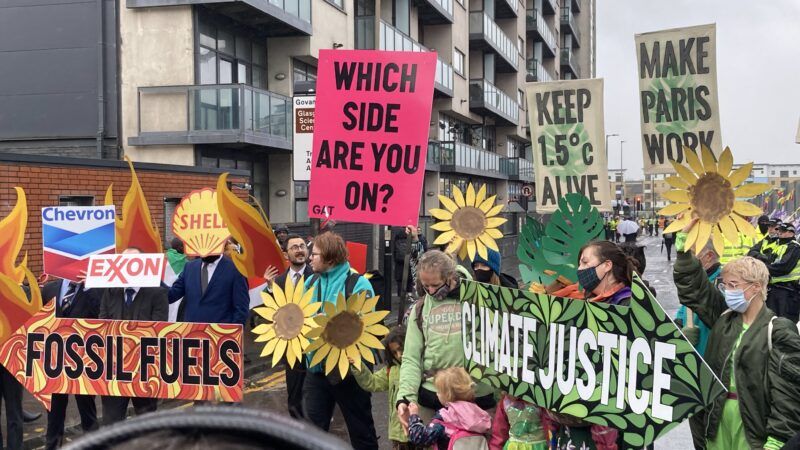Furious Activists Walk Out of U.N. Climate Change Conference in Glasgow
The policies and technologies they reject as "false solutions" would actually work to mitigate climate change.

Glasgow - The 26th United Nations Climate Change Conference (COP26), like its predecessors, is dramatically rushing toward its usual inconclusive conclusion. And just as usual, climate activists are furiously furious about that. Some 200 activists staged a walkout of the conference venue earlier today while simultaneously issuing "The People's COP26 Decision for Climate Justice." And just what are the "people" demanding?
Of course, the first priority is money. Specifically, they are demanding that the rich developed countries annually supply the $100 billion in climate aid promised to poor countries in the 2009 Copenhagen Accord. Additionally, they demand that rich countries "rapidly scale up finance for adaptation based on the needs of those most impacted."
More man-made warming is already baked into the climate system, so individuals, governments, and companies will all have to make investments that enable them to handle future changes. However, the best way to strengthen resilience is not ineffective foreign aid to corrupt oligarchies in poor countries, but policies that encourage free markets and economic growth. As the United Kingdom's Royal Geographical Society has noted, "The vast majority of lives both lost and affected by natural disasters come from developing countries, underlining the link between poverty and vulnerability to disaster." Dozens may die as a result of hurricanes in the richer and more resilient countries, whereas a similarly ferocious tropical storm will kill thousands in poor countries. The difference is that greater wealth affords stronger infrastructure, better early warning systems, and a quicker ability to escape danger.
The activists also call upon governments to "reject false solutions." These include "offsetting, carbon markets, carbon capture technologies, nature based solutions, geoengineering, climate smart agriculture, and others that are inherently ineffective, unjust, and destructive." Offsetting is a way for a company to compensate for its hard-to-reduce emissions by funding equivalent carbon dioxide saving elsewhere. Carbon markets, like the European Union Emissions Trading System, aim to reduce emissions cost-effectively by setting limits on the amounts companies are allowed to emit and enabling the trading of emission units that account for emission reductions. The activists are not wrong that the carbon capture technologies are not yet viable.
On the other hand, nature-based solutions such as planting billions of trees could significantly reduce atmospheric carbon dioxide concentrations and help keep global average temperatures from rising by more than 2°C by 2100. Climate-smart agriculture would involve, among other things, reducing the amount of nitrogen fertilizers applied to crops, which in turn would reduce the amounts of the highly potent greenhouse gas nitrous oxide released into the atmosphere.
In addition, farmers could improve their soils and sequester more carbon dioxide by plowing under burnt crop residues (biochar), planting cover crops, and using conservation tillage. Given that the activists say they want to reduce carbon dioxide emissions in order to keep the global average temperature from rising by more than 2°C, why in the world would they be against any of these processes and technologies?
They are also against geoengineering the climate. While measures like cutting solar radiation by injecting sulfur dioxide particles into the stratosphere to cool the planet do have risks, it seems reasonable to conduct some limited experiments to see if such approaches could serve as an emergency backup to prevent unexpectedly rapid warming of the climate.
In fact, none of the processes and technologies that the activists seem to reject are "false solutions," with perhaps the exception of carbon capture. In any case, what do they want instead? They evidently demand a "just transition" that "must result in collaborating to rapidly share technology and finance to implement real, proven, and people-centered solutions at scale."
As noted above, they are, of course, very interested in "finance" for adaptation, but what exactly "real, proven, and people-centered solutions" are goes entirely unsaid. The activists further demand that "countries must guarantee full engagement of workers and their unions through social dialogue processes in raising climate ambition and the creation of decent work, quality jobs, social protection and universal public services."
These things may be good, but any necessary logical relationship to the goal of cutting greenhouse gases as a way to address the risks of man-made climate is opaque at best.
Instead, the activists seem to be channeling author Naomi Klein's assertion from her 2014 book, This Changes Everything: Capitalism vs. the Climate, that climate change has given progressives "the most powerful argument against unfettered capitalism" ever.


Show Comments (191)